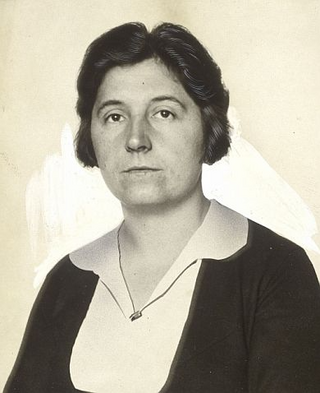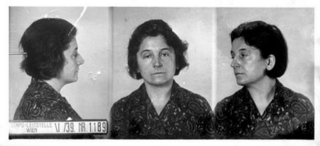Rosa Jochmann

Personalia
Born:
Died:
Profession:
Persecution:
Imprisonment 22.08.1939 - 21.03.1940,
Ravensbrück concentration camp 21.03.1940 - 01.05.1945
KZ Number:
Honors:
Decoration of Honor for Services to the Liberation of Austria
Honorary Citizen of the City of Vienna
Memberships
Curriculum Vitae
Rosa Jochmann was born in Vienna as the fourth of six legitimate children of the iron foundryman Karl Jochmann and the laundress and cleaner Josefa, née Schlögl. Her parents immigrated from Moravia, which is why the children grow up bilingual. Karl Jochmann is a committed member of the Social Democratic Workers' Party [today: SPÖ]. Shortly after her birth, the family moved from Vienna-Brigittenau to Vienna-Simmering, where Rosa Jochmann attended primary and secondary school. After the death of her mother in 1915, she had to look after her younger siblings. At the age of fourteen, she finds her first job as an assistant worker at the confectionery factory Victor Schmidt & Söhne. In 1916, she was conscripted into military service at the Simmering wire and cable factory Ariadne, then at the candle and soap factory Apollo [note: the Apollo candle and soap factory was later merged into the Unilever Group].
Rosa Jochmann's interest in politics was awakened by her father. She initially became a functionary on the factory committee of the chemical workers' association, but soon moved from Apollo to the Auer company, which produced gas mantles. In 1920, not even twenty years old, she was elected Chairman of the Works Council. In the same year, her father died at the age of 44. In 1923, she left the Catholic Church. In 1926, she was appointed secretary of the chemical workers' union, responsible for organizing women in this industrial sector. In the same year, she was among the first graduates of the workers' college in Döbling and found a supporter in her teacher Otto Bauer. She soon rose to the top of the party: in 1932 she worked as the central secretary of the Socialist Women and was their delegate at a party conference for the first time. In 1933, she was elected to the party executive.
After the socialist uprising in February 1934, Rosa Jochmann joined the Revolutionary Socialists under the pseudonym 'Josefine Drechsler'. Together with Karl Holoubek, Roman Felleis and Ludwig Kostroun, she formed the first (illegal) Central Committee, which was headed by Manfred Ackermann. On 28 August 1934, she was arrested in Wiener Neustadt and sentenced to one year and three months in prison.
After her release on 26 November 1935, Rosa Jochmann distributed the illegal Workers' Newspaper, organized meetings and helped to maintain contact with the foreign office of the Austrian Social Democrats in Brno (ALÖS). In mid-July 1936 and mid-August 1938, she is again imprisoned for 14 days at a time. Between 1934 and 1938, she was unemployed.
When Federal Chancellor Kurt von Schuschnigg tentatively sought reconciliation with the workers' movement shortly before the imminent invasion of the German Wehrmacht, it was Rosa Jochmann who traveled to Brno for the last time to visit the leading party ideologue Otto Bauer.
Although she was offered the opportunity to flee, Rosa Jochmann remained in Vienna, where she was arrested by the Gestapo on August 22, 1939, just before the German invasion of Poland and the associated outbreak of World War II. On March 21, 1940, she was deported to the Ravensbrück concentration camp

When the camp was liberated by Soviet troops on May 1, 1945, Rosa Jochmann stayed behind with many others to care for the sick and waited in vain for the Austrian government to bring her compatriots home. Finally, she and her campmate Friedl Sedlacek set off on their own to organize a ride home for themselves and their fellow prisoners. On the journey home, she also comes across the former governor of Lower Austria Josef Reither.
In Berlin, a skinny man spoke to us in Austrian dialect. He asked for a lift. I told him that we were only allowed to transport former concentration camp prisoners. 'I'm a concentration camp prisoner too,' the man replied. It was the former governor of Lower Austria, Josef Reither. He was one of those Christian Socialists who would have loved to build a bridge to the Social Democrats - just like Leopold Kunschak. Of course, we then took Josef Reither with us and assigned him the most beautiful seat [...]
She finds her apartment in Vienna bombed out. She firmly rejected the offer to move into an 'aryanized' Jewish villa in Döbling, from which the National Socialist owners had fled, and for years was content with a single room as a place to stay.
Back in Vienna, she immediately became politically active again, becoming a National Councillor in 1945, a member of the party executive, Women's Central Secretary and Deputy Chairwoman of the SPÖ. In 1959, she became Chairwoman of the Women's Central Committee of the SPÖ.
From 1948 to 1990, she was Chairwoman of the Federation of Socialist Freedom Fighters and Victims of Fascism, 1963-1994 Vice-President of the Documentation Archive of Austrian Resistance (DÖW).
In 1967, she retired and resigned from all party functions and her mandate. She only retained those in the Victims' Association and the DÖW.
Places
Residence:
Persecution:
Honoring:
Citations
Wiener Stadt- und Landesarchiv (WStLA)
Wien.Geschichte.Wiki unter www.geschichtewiki.wien.gv.at/Rosa_Jochmann
Wikipedia unter de.wikipedia.org/wiki/Rosa_Jochmann
Krause, Peter/Reinelt, Herbert/Schmitt, Helmut (2020): Farbe tragen, Farbe bekennen. Katholische Korporierte in Widerstand und Verfolgung. Teil 2. Kuhl, Manfred (ÖVfStG, Wien) S. 278 - 280.
Matricula Online
